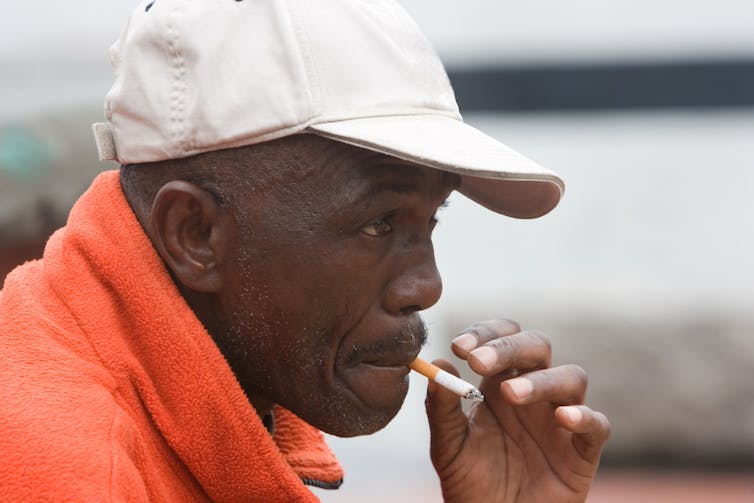How South Africa is tightening its tobacco rules

Shutterstock
South Africa’s Health Minister Aaron Motsoaledi has published a new tobacco control bill which, if passed into law, will tighten the grip on how cigarettes and other tobacco products are sold, marketed and regulated in the country. Health and Medicine Editor Candice Bailey asked Catherine Egbe about what it means for tobacco control.
What’s significant about South Africa’s pending tobacco control legislation?
There are five key areas of tobacco control that the new bill seeks to address:
- a smoke-free policy,
- plain or standardised cigarette packaging,
- regulating e-cigarettes,
- points of sale marketing, and
- removing cigarette vending machines.
Some are addressed in South Africa’s current tobacco control law. But the country still doesn’t fully comply with the standards set by the World Health Organisation’s Framework Convention on Tobacco Control. South Africa signed the convention in 2005.
Smoke-free public places is one example. The current law bans smoking in public places but allows for designated smoking areas in places like bars, taverns and restaurants provided that they do not take up more than 25% of the venue.
The WHO’s convention calls for 100% smoke-free public places to protect non-smokers fully.
In line with this, the new bill calls for a 100% ban on smoking in public places. It will also ban the advertising of cigarettes and other products at tills or selling them in vending machines.
The health warnings on cigarette boxes and other tobacco product packages is another example. The current law allows for text health warning on 20% of the package. But the convention calls for a minimum of 30% and encourages countries to have the more effective plain or standardised packaging with graphic and textual warnings in place.
So the new law mandates standardised packaging with graphic health warnings to make tobacco packages less attractive to new smokers and to discourage old smokers from continuing to smoke.
The bill is also significant because it attempts to regulate e-cigarettes for the first time in South Africa. To date e-cigarettes have been freely marketed and sold anywhere to anyone, including children.
Is there evidence that the planned interventions will work?
There’s a great deal of evidence from the rest of the world.
Let’s start with smoke-free policies. In countries like South Korea and the US where they are in place, research shows that they led to an overall improvement in health, particularly children’s health.
Incidents of smoking-related cancers went down and there was a reduction in childhood smoking. There was also an increase in the number of smokers saying they want to quit.
When it comes to packaging, studies show that it encourages smokers to quit and discourages young people from wanting to start smoking. Plain packaging was first introduced in Australia in 2012.
E-cigarettes are still a relatively new factor. But research is already casting doubts on various claims made about them. First introduced in China in 2004 they were initially mooted as an aid to quit smoking. But research shows that they in fact encourage young people to start smoking cigarettes. And 18 studies have shown that e-cigarettes do not reduce quit rates. Instead, the latest research shows that they do the reverse – they reduce the quit rates of smokers intending to quit by about 66%.
There are 83 countries that regulate e-cigarettes and about 27 that have completely banned their sale. These include Brazil, Singapore, Uruguay, Seychelles and Uganda.
The advertising, promotion and sponsorship of e-cigarettes are regulated or prohibited in 62 countries.
Why is it important to have a legislation like this?
Tobacco smoking is the single most preventable cause of death in the world. Smoking also worsens TB and HIV treatment outcomes. Yet 37% of South African men and 6.8% of South African women aged 15 years and older use tobacco .
Before the WHO Framework Convention on Tobacco Control, South Africa was a leader in tobacco control in Africa and across the world because of strong tobacco control legislation it had put in place. But the laws weren’t updated according to current WHO’s standards and the country now lags behind some other African countries.
The new legislation will place South Africa on the right path. Apart from saving millions of lives, it will ensure that South Africa fulfils its obligation as a party to the WHO convention.
There are several benefits to having strong legislation.
Firstly, it will protect millions of South Africans who don’t smoke but take in secondhand smoke from those who do. They face the same health risks as active smokers.
Secondly, it will also help encourage people to quit and live healthier lives and discourage young people from starting.
And thirdly, the tobacco industry views young people as replacement smokers. Strong legislation will prevent young people from being manipulated by the tobacco industry.
What are the next steps?
![]() Once the bill becomes law, the health minister will have to draw up several regulations to guide its implementation. These will ensure that the law is interpreted correctly and not manipulated by the tobacco industry and that the potential gains of the legislation are not watered down.
Once the bill becomes law, the health minister will have to draw up several regulations to guide its implementation. These will ensure that the law is interpreted correctly and not manipulated by the tobacco industry and that the potential gains of the legislation are not watered down.
Catherine O. Egbe, PhD, Specialist Scientist, Alcohol Tobacco and Other Drug Research Unit, South African Medical Research Council
This article was originally published on The Conversation.
Written by: Natasha
Similar posts
MORE ARTICLES

Two boys accused of killing Grade 10 pupil remain behind bars

45 individuals arrested in Pretoria for drunk driving over the weekend

Pics: Inside Liesl Laurie-Mthombeni’s girls’ vacation

Berita celebrates 34th birthday with new single ‘Gugulethu’

Gauteng settles major e-toll debt with R5.4 billion payment
QUICK LINKS
UpComing Shows

959 Music Weekdays
Kaya 959 Hits
Real. Familiar. Memorable. Kaya 959 brings you the music you know and love from our playlist. Uninterrupted. Thursdays 20h00 to 21h00
close
The Best T in the City
With T Bose
He has held it down in the world of mid-morning radio with the best music, riveting topics, brilliant mixes and interesting guests. Every weekday, The Best T proves why he is the BEST by connecting to you like only your bro or favourite uncle could. He lets his listeners dictate the songs they want to hear in the ever-popular Top 10 at 10, and his Three Teaspoons never run out. Catch The Best T in the City Mondays to Fridays from 09h00 to 12h00.
close
Feel Good
With Andy Maqondwana
Feel good about feeling good! That's exactly what The Feel-Good show is about. An escape from the negativity that surrounds us, indulging you in good feels. Pass it on to one and all. Spread the good feeling around Gauteng with Andy Maqondwana.
close
Kaya Biz
With Gugulethu Mfuphi
The world of business is simplified for you by Kaya Biz with Gugulethu Mfuphi. This fast-paced award-winning business show talks to the corporate giants as well as up and coming entrepreneurs about their wins and challenges. Gugulethu invites guests to offer their analyses of markets and economies, and also delves into issues of personal financial wellness. Kaya Biz airs Mondays to Thursdays 18h00 to 19h00.
close
Point of View
With Phemelo Motene
Point of View with Phemelo Motene delves into the day’s current affairs, touches on real issues that affect people’s daily lives and shares expert advice on questions posed by the audience. Mondays to Thursdays 20:00 to 22:00.
closeConnect with Kaya 959
DownLoad Our Mobile App
© 2025 Kaya 959 | On The Street On The Air










